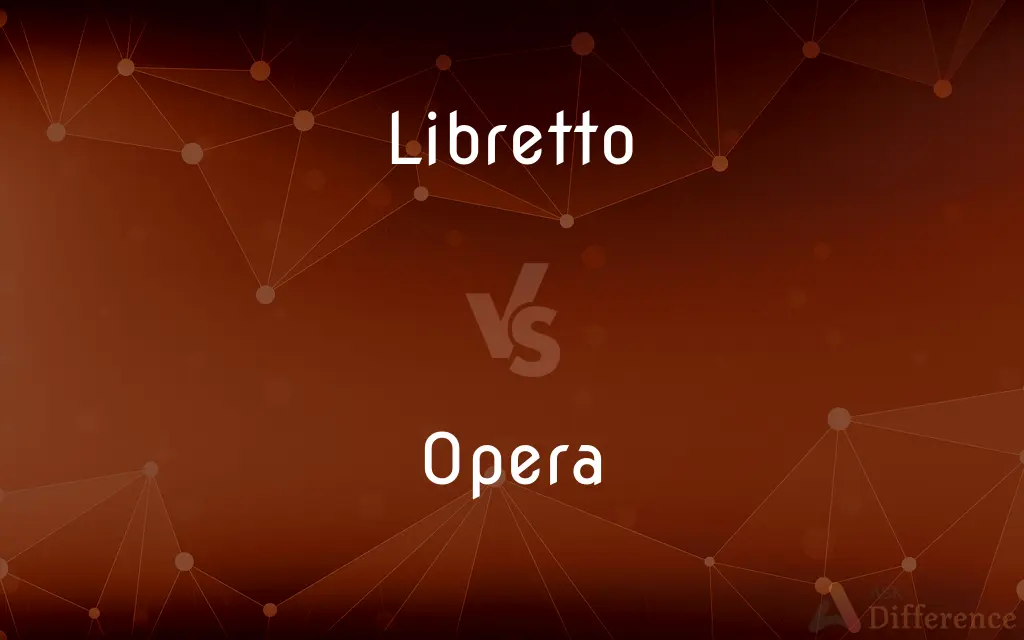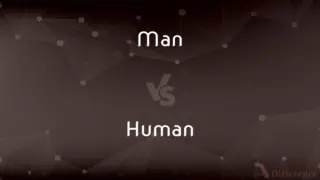Libretto vs. Opera — What's the Difference?
Edited by Tayyaba Rehman — By Maham Liaqat — Updated on April 9, 2024
A libretto is the text for an opera, while an opera combines this text with music.

Difference Between Libretto and Opera
Table of Contents
ADVERTISEMENT
Key Differences
A libretto serves as the textual foundation of an opera, comprising the script, dialogue, and lyrical content that singers perform. It's essentially the opera's "book," detailing the story, character interactions, and emotional underpinnings. Opera, however, is a comprehensive art form that melds the libretto with orchestral music, vocal performance, acting, stage design, and sometimes dance, to create a multi-dimensional spectacle.
The libretto guides the performers in understanding the narrative and emotions of the piece, acting as a blueprint for the opera's storytelling. It sets the stage for the drama and guides composers in creating music that enhances the text's emotional weight. Meanwhile, an opera's music elevates the text, bringing the libretto's narratives and emotions to life through powerful vocal and orchestral compositions, thus transforming words into a full sensory experience.
While the libretto can stand on its own as a literary work, its full potential is realized when combined with music in an opera. The transformation from text to performance involves collaboration among librettists, composers, directors, singers, and other artists, making opera a collective creation that transcends the written word. In contrast, reading a libretto alone offers a glimpse into the opera's narrative and thematic essence without the depth provided by its musical and performative elements.
Operas are known for their emotional depth and musical complexity, with the libretto providing a framework for the composers and performers to express a wide range of human experiences. Librettos often tackle themes of love, betrayal, heroism, and tragedy, with language crafted to complement the music's emotional impact. On the other hand, the opera as a whole captivates audiences by combining these elements into a unified and immersive artistic experience, showcasing the synergy between text and music.
The creation of an opera often begins with the libretto, underscoring its importance in the operatic process. Librettists work closely with composers to ensure that the text aligns with the musical vision, often adjusting the libretto to suit the music's needs. This collaborative process highlights the dynamic relationship between the libretto and the opera, where text and music interweave to convey a story more powerfully than either could alone.
ADVERTISEMENT
Comparison Chart
Definition
Text of an opera
A staged musical work combining libretto, music, and performance
Components
Script, dialogue, lyrics
Music, libretto, acting, stage design, sometimes dance
Role
Provides narrative and emotional context
Integrates music and performance to bring the narrative to life
Standalone
Can be read independently
Requires performance for full expression
Creation
Often precedes music composition
Culmination of collaborative creative efforts
Compare with Definitions
Libretto
Script for Opera.
The libretto of La Traviata outlines the tragic love story of Violetta.
Opera
Collaborative Creation.
Don Giovanni showcases the collaborative genius of Mozart and his librettist Lorenzo Da Ponte.
Libretto
Narrative Foundation.
The libretto for Carmen sets the stage for a drama of love and jealousy.
Opera
Emotional Storytelling.
Verdi's La Traviata uses both libretto and music to tell a poignant story of love and sacrifice.
Libretto
Literary Work.
Wagner's librettos for his operas are considered significant literary achievements.
Opera
Staged Musical Drama.
Puccini's Tosca is an opera renowned for its dramatic intensity and memorable music.
Libretto
Blueprint for Performance.
The libretto of Madama Butterfly provides the emotional and narrative structure for the opera.
Opera
Cultural Masterpiece.
Wagner's The Ring of the Nibelung is considered one of the greatest operatic achievements, integrating complex librettos with revolutionary music.
Libretto
Dialogue and Lyrics.
Every line sung in The Marriage of Figaro is meticulously detailed in its libretto.
Opera
Combination of Arts.
The Magic Flute combines Mozart's music with a fantastical libretto in a visually stunning production.
Libretto
A libretto (Italian for "booklet") is the text used in, or intended for, an extended musical work such as an opera, operetta, masque, oratorio, cantata or musical. The term libretto is also sometimes used to refer to the text of major liturgical works, such as the Mass, requiem and sacred cantata, or the story line of a ballet.
Opera
Opera is a form of theatre in which music is a fundamental component and dramatic roles are taken by singers, but is distinct from musical theatre. Such a "work" (the literal translation of the Italian word "opera") is typically a collaboration between a composer and a librettist and incorporates a number of the performing arts, such as acting, scenery, costume, and sometimes dance or ballet.
Libretto
The text of a dramatic musical work such as an opera, including the lyrics to be sung and sometimes interpolated spoken passages.
Opera
A theatrical presentation in which a dramatic performance is set to music.
Libretto
A book containing such a text.
Opera
The score of such a work.
Libretto
The text of a dramatic musical work, such as an opera.
Opera
A theater designed primarily for operas.
Libretto
A book containing such a text.
Opera
A plural of opus.
Libretto
A book containing the words of an opera or extended piece of music.
Opera
A creative work, especially a musical composition numbered to designate the order of a composer's works.
Libretto
The words of an opera or musical play
Opera
(music) A theatrical work, combining drama, music, song and sometimes dance.
Opera
(music) The score for such a work.
Opera
A building designed for the performance of such works; an opera house.
Opera
A company dedicated to performing such works.
Opera
(by extension) Any showy, melodramatic or unrealistic production resembling an opera.
Opera
Plural of opus; a collection of work.
Opera
A drama, either tragic or comic, of which music forms an essential part; a drama wholly or mostly sung, consisting of recitative, arias, choruses, duets, trios, etc., with orchestral accompaniment, preludes, and interludes, together with appropriate costumes, scenery, and action; a lyric drama.
Opera
The score of a musical drama, either written or in print; a play set to music.
Opera
The house where operas are exhibited.
Opera
A drama set to music; consists of singing with orchestral accompaniment and an orchestral overture and interludes
Opera
Theater where opera is performed
Common Curiosities
Are all operas based on original librettos?
Not all; some operas are adaptations of existing literary works, but they all require a libretto as the basis for performance.
Can operas be performed without a libretto?
No, the libretto is essential for the opera as it forms the story and lyrics that are performed.
How do librettists and composers collaborate?
Librettists and composers work closely, often adjusting the libretto to better suit the musical and dramatic needs of the opera.
Can operas be based on contemporary events or themes?
Yes, contemporary operas often tackle current events and themes, reflecting modern society through the interplay of libretto and music.
How important is the libretto to the overall success of an opera?
The libretto is crucial, as it lays the groundwork for the story and emotional journey that the music and performance bring to life.
What is the primary purpose of a libretto in opera?
The primary purpose of a libretto is to provide the textual narrative and emotional context for the opera.
How does opera music relate to the libretto?
Opera music is composed to enhance and elevate the libretto's narrative and emotional content, creating a more profound artistic experience.
What is the historical significance of the libretto in opera development?
Historically, the libretto has been the starting point for opera creation, shaping the genre's evolution by influencing composers and performers.
Can a libretto be considered a form of poetry?
Yes, many librettos are highly poetic and are valued for their literary qualities apart from the music.
Do modern operas follow the same format as classical operas?
While modern operas may experiment with form and content, they still integrate music and a libretto in their structure.
How are opera roles determined by the libretto?
The libretto outlines the characters and their relationships, guiding casting decisions and character portrayal.
How do audiences interpret operas differently based on the libretto and music?
Audiences may interpret operas differently based on their personal connections to the themes, the performance quality, and the effectiveness of the music and libretto in conveying the story and emotions.
What makes an opera different from a musical?
Operas typically emphasize classical music and vocal performance, with the music driving the narrative, while musicals often feature spoken dialogue and a variety of musical styles.
What challenges do librettists face when writing for opera?
Librettists must craft compelling narratives that align with musical composition, balancing lyrical quality with clarity and dramatic impact.
What role do stage design and acting play in opera?
Stage design and acting, along with music and the libretto, create a fully immersive and emotionally engaging experience for the audience.
Share Your Discovery

Previous Comparison
Man vs. Human
Next Comparison
Mustard vs. WasabiAuthor Spotlight
Written by
Maham LiaqatEdited by
Tayyaba RehmanTayyaba Rehman is a distinguished writer, currently serving as a primary contributor to askdifference.com. As a researcher in semantics and etymology, Tayyaba's passion for the complexity of languages and their distinctions has found a perfect home on the platform. Tayyaba delves into the intricacies of language, distinguishing between commonly confused words and phrases, thereby providing clarity for readers worldwide.
















































